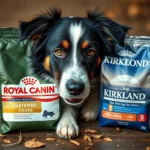
Introduction
Dog nutrition is a vital aspect of pet ownership that directly influences the health, behavior, and overall well-being of our furry friends. Ensuring that dogs receive a balanced diet tailored to their specific needs is crucial, yet many pet owners are often misled by common misconceptions surrounding canine diets. One such topic that frequently arises in discussions about dog nutrition is whether dogs can safely consume milk. This inquiry not only captures the curiosity of pet owners but also highlights the importance of understanding the nutritional needs of dogs.
Understanding Dog Nutrition
Nutritional Needs of Dogs
To provide adequate nutrition for dogs, it’s essential to understand their unique dietary needs. Dogs, like all animals, require a balanced intake of macronutrients and micronutrients to thrive.
- Proteins: Essential for growth, maintenance, and repair of tissues. High-quality protein sources, such as lean meats and fish, should be included in a dog’s diet.
- Fats: A crucial energy source that also aids in the absorption of fat-soluble vitamins. Healthy fats, such as those from fish oil and flaxseed, are beneficial for skin and coat health.
- Carbohydrates: While not an essential macronutrient, carbohydrates can serve as a source of energy and fiber. Whole grains and vegetables are excellent sources.
In addition to macronutrients, dogs require various vitamins and minerals to support their immune system, bone health, and metabolic functions. A well-rounded diet that meets these nutritional needs is paramount for a dog’s longevity and quality of life.
Life Stages and Nutritional Requirements
The nutritional requirements of dogs vary significantly across different life stages:
- Puppies: Growing dogs need a diet rich in protein and calories to support their rapid growth and high energy levels. Puppy food is specially formulated to meet these needs.
- Adult Dogs: Nutritional needs stabilize once dogs reach adulthood. A balanced diet that maintains a healthy weight is vital to prevent obesity and related health issues.
- Senior Dogs: Older dogs may require diets lower in calories but higher in fiber to aid digestion. They may also benefit from joint supplements to maintain mobility.
Additionally, pregnant or nursing dogs have increased nutritional demands to support the health of their puppies.
The Role of Dairy in Dog Diets
Nutritional Profile of Milk
Milk is a source of several key nutrients, making it a topic of interest in canine nutrition. It contains:
- Calcium: Essential for bone health and development.
- Protein: A complete protein source that provides essential amino acids.
- Vitamins: Milk is rich in B vitamins and vitamin D, which are important for various bodily functions.
Comparatively, while milk can offer some nutritional benefits, it is not a substitute for dog-specific diets designed to meet their comprehensive needs.
Types of Dairy Products
Dairy products come in various forms, including:
- Milk: Whole, skim, and lactose-free varieties.
- Cheese: Typically lower in lactose but high in fat.
- Yogurt: Often contains beneficial probiotics, making it easier to digest.
The lactose content in these products varies, affecting their digestibility for dogs.
Can Dogs Drink Milk?
Lactose Intolerance in Dogs
Many dogs exhibit lactose intolerance, meaning they lack sufficient levels of lactase, the enzyme needed to digest lactose—the sugar found in milk. Symptoms of lactose intolerance can include:
- Diarrhea
- Gas
- Stomach cramps
- Vomiting
If a dog shows signs of discomfort after consuming milk, it may indicate lactose intolerance, and owners should consider eliminating dairy from their diet.
Benefits of Milk for Dogs
For those dogs that can tolerate milk, there are potential benefits:
- Nutritional Boost: Milk can provide additional protein and calcium.
- Treat or Training Aid: Small amounts of milk can be used as a treat or to encourage training behaviors.
Risks and Limitations
Despite the potential benefits, there are risks associated with giving milk to dogs:
- Digestive Issues: Even dogs that can tolerate milk may experience digestive upset if given too much.
- Weight Gain: Milk is calorie-dense and can contribute to obesity if not moderated.
It’s advisable for dog owners to limit milk to small quantities and to monitor for any adverse reactions.
Alternatives to Milk for Dogs
Lactose-Free Dairy Options
Lactose-free dairy products are available and provide a way for lactose-intolerant dogs to enjoy dairy without the side effects. These options include:
- Lactose-Free Milk: Offers the same nutritional benefits as regular milk but without the lactose.
- Lactose-Free Yogurt and Cheese: Can also provide probiotics and calcium without the digestive issues.
Non-Dairy Alternatives
For dog owners looking for non-dairy options, several alternatives exist:
- Coconut Milk: Contains healthy fats and can be a flavorful treat.
- Almond Milk: Generally low in calories, but be cautious of added sugars and flavors.
When introducing any new food, it’s essential to consider safety and nutritional implications. Always consult with a veterinarian if unsure about a specific product.
Expert Opinions and Research
Veterinarian Insights
Veterinarians typically recommend moderation when it comes to feeding dogs dairy products. Many agree that while small amounts of milk can be acceptable for dogs that tolerate it, it’s not a necessary component of their diet. Anecdotal evidence from veterinarians often indicates that many dogs do not react well to milk, which reinforces the importance of understanding each individual dog’s tolerance.
Current Research Findings
Recent studies have investigated the effects of dairy on canine health, highlighting that while some dogs can handle dairy without issues, others may experience negative gastrointestinal effects. Insights from animal nutritionists suggest that the focus should remain on a balanced diet tailored to the dog’s specific needs rather than relying on dairy for nutritional benefits.
Practical Tips for Dog Owners
How to Introduce Milk Safely
If considering adding milk to a dog’s diet, it’s essential to do so gradually. Here are some tips:
- Start Small: Introduce a small amount and observe your dog for any adverse reactions.
- Monitor Reactions: Look for signs of discomfort or digestive upset over the following hours and days.
- Consult Your Vet: Always a wise choice, especially for dogs with existing health concerns.
Creating a Balanced Diet
Integrating milk or its alternatives into a dog’s diet can be done but should be approached with caution. Here are some guidelines:
- Variety is Key: A balanced diet includes a variety of foods to meet all nutritional needs.
- Moderation: Treats, including milk, should only make up a small part of the overall diet.
- Quality Ingredients: Always prioritize high-quality dog food that meets the nutritional standards set by veterinary associations.
Conclusion
In summary, the question of whether dogs can drink milk is nuanced, depending on individual tolerance and dietary needs. While milk can offer some nutritional benefits for certain dogs, it is crucial to approach this dietary addition with caution. Monitoring for adverse reactions and consulting with a veterinarian can help ensure a balanced and healthy diet tailored to your dog’s specific requirements.
Encouraging pet owners to share their experiences with milk and dog nutrition can foster a community of learning and support, helping all dogs lead healthier, happier lives.









